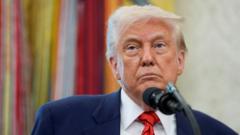Trump's actions challenge decades of U.S.-Israel relations as he engages in direct talks with Syria and other Middle Eastern nations while sidelining Israel's concerns.
Trump's Bold Middle East Pivot: Sidelining Israel in New Diplomacy

Trump's Bold Middle East Pivot: Sidelining Israel in New Diplomacy
In a significant shift, President Trump's recent Middle East approach highlights a departure from traditional U.S. support for Israel.
When President Trump met with Syria's newly appointed leader, Ahmed al-Shara, at the Saudi royal palace, he announced plans to lift sanctions on Syria in a gesture to foster potential partnerships and stability. This move raised eyebrows, particularly in Israel, where PM Benjamin Netanyahu's government deems al-Shara as a threat due to his previous connections with Al Qaeda. The U.S. President referred to al-Shara as a "tough guy" and asserted that ending the sanctions would "give them a chance at greatness," a stance divergent from Israel's hardline view.
Historically, Israel has been a linchpin of U.S diplomacy in the Middle East, but Trump's recent dealings signal a potential reconfiguration of priorities. During his journey from Riyadh to Doha, he dismissed any claims that he was distancing the U.S. from its long-standing ally. "No, not at all," he affirmed to reporters, characterizing his engagement with Middle Eastern nations as beneficial for Israel.
While the long-standing military and economic ties with Israel remain intact, Trump's approach is indicative of a broader realignment in U.S. foreign policy affecting historic alliances. As he continues to pursue a multifaceted strategy across the region, the implications for Israel's position and influence remain uncertain, igniting debate about the future dynamics of U.S. diplomacy in the Middle East.
Historically, Israel has been a linchpin of U.S diplomacy in the Middle East, but Trump's recent dealings signal a potential reconfiguration of priorities. During his journey from Riyadh to Doha, he dismissed any claims that he was distancing the U.S. from its long-standing ally. "No, not at all," he affirmed to reporters, characterizing his engagement with Middle Eastern nations as beneficial for Israel.
While the long-standing military and economic ties with Israel remain intact, Trump's approach is indicative of a broader realignment in U.S. foreign policy affecting historic alliances. As he continues to pursue a multifaceted strategy across the region, the implications for Israel's position and influence remain uncertain, igniting debate about the future dynamics of U.S. diplomacy in the Middle East.





















